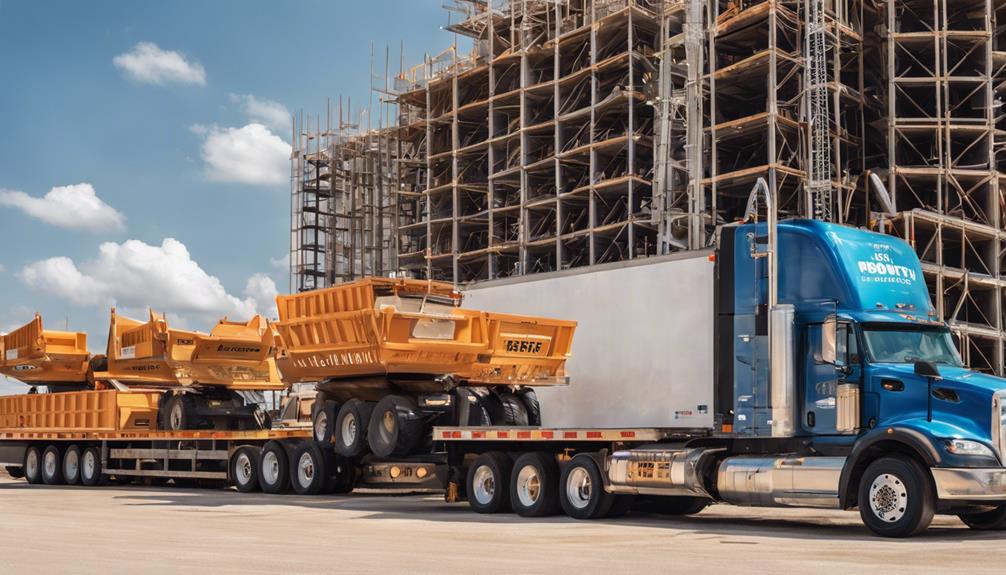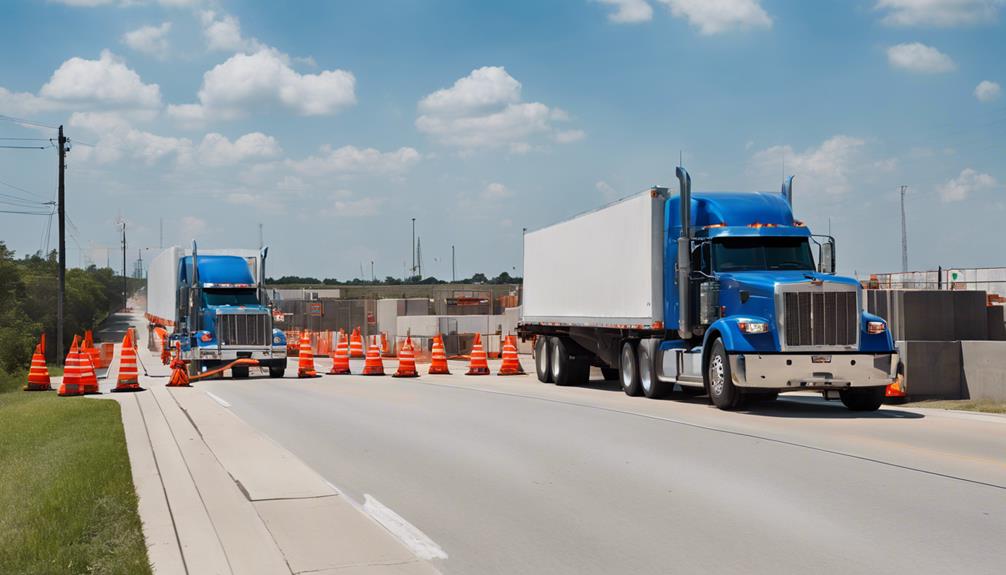When you're transporting oversize, overweight, overlength, or overheight loads in Harris County, securing the right bond is essential. This bond not only serves as a financial guarantee but also ensures you're meeting all local regulations and safety standards. Understanding the specific requirements and application process can save you from potential fines and delays. Yet, many transporters overlook critical aspects that could impact their operations. What could these oversights mean for your project's timeline and budget?
Understanding Load Definitions

When dealing with the Harris County Load Bond, grasping load definitions is crucial. You need to understand what constitutes an oversize, overweight, overlength, or overheight load to navigate regulations effectively.
An oversize load exceeds the standard width or height limits set by local authorities. Typically, this means anything wider than 8.5 feet or taller than 13.5 feet, so keep those measurements in mind.
An overweight load surpasses the weight limits established for roadways, which can vary based on the type of vehicle and road conditions. Be aware of these limits to avoid fines or delays.
Overlength loads are those that extend beyond the usual length restrictions, usually longer than 48 feet for general cargo. Lastly, overheight loads refer to any cargo that exceeds the designated height limits.
Know these definitions well, as they play a vital role in ensuring compliance with the Harris County Load Bond requirements. Accurate load definitions not only help you avoid potential penalties but also facilitate smoother transportation processes.
Importance of Securing a Bond
Securing a bond is essential for anyone involved in transporting oversized or overweight loads in Harris County. It serves as a financial safety net, protecting you and local authorities from potential damages or accidents that may arise during transport.
This bond falls under the category of commercial bonds, ensuring that you meet the necessary obligations required by local regulations. Without this bond, you could face serious liabilities, including hefty fines or repair costs if something goes wrong.
Additionally, having a bond demonstrates your commitment to upholding safety standards and regulations. This not only builds trust with local officials but also enhances your reputation within the transport community. It shows that you're responsible and prepared to take on the challenges associated with moving heavy or large loads.
Moreover, securing a bond often speeds up the permitting process. When authorities see that you've taken the necessary precautions, they're more likely to approve your applications quickly, allowing you to stay on schedule and avoid costly delays.
In the competitive transport industry, a bond can give you an edge, ensuring that you're compliant with local laws while providing peace of mind.
Ultimately, investing in a bond is a smart move that safeguards your business and keeps your operations running smoothly.
Bond Requirements in Harris County

Anyone involved in transporting oversized or overweight loads in Harris County needs to be aware of the specific bond requirements that apply.
These bonds serve as a financial guarantee that you'll adhere to local regulations and cover any potential damages resulting from your transport activities. In Harris County, bonds like the Louisiana Movement of Vehicles of Excess Dimensions or Weight Bond are crucial for ensuring compliance with state regulations and protecting local governments.
To meet the bond requirements, you'll typically need to secure a surety bond. This bond must cover the full extent of potential damages, which can vary based on the size and weight of your load.
It's essential to check with the Harris County authorities for the exact amount you'll need, as this can change.
You'll also want to ensure that your bond remains valid throughout the duration of your project. If your transport activities extend beyond the expected timeline, you may need to renew or adjust your bond accordingly.
Failure to meet these bond requirements can lead to fines, project delays, or even legal consequences.
Application Process for Bonds
Understanding the bond requirements is just the first step; the application process for obtaining a bond is equally important. To begin, you'll need to gather all necessary documents, including proof of insurance and any relevant identification.
Make sure you have your business information ready, as this will help streamline the process. It's also beneficial to familiarize yourself with surety bond services offered by experienced bonding teams, as they can assist you throughout the application.
Next, you'll fill out the bond application form. This form typically requests details about your company, the type of loads you intend to transport, and the coverage amount you're seeking.
Be thorough and accurate; any discrepancies can delay your application.
Once you've completed the form, submit it along with the required documents to the appropriate office in Harris County. After submission, you might've to pay a fee, which varies based on the bond type and coverage amount.
After evaluating your application, the county will reach out if they need additional information. If everything checks out, you'll receive your bond in a timely manner.
Always keep a copy of your bond on hand, as you'll need it for compliance and verification during your hauling activities.
Permits Required for Heavy Loads

When transporting heavy loads, it's essential to obtain the necessary permits to comply with local regulations. These permits ensure that your transport meets safety and legal standards, avoiding costly fines or delays. Depending on the size and weight of your load, you'll likely need to apply for an oversize or overweight permit from the Harris County authorities.
You should start by gathering all relevant information about your load, including dimensions, weight, and route details. This information is crucial for the application process.
Next, check with the Harris County transportation department to find out which specific permits you need. Each permit may have different requirements, so it's important to follow their guidelines closely.
Most permits can be applied for online, streamlining the process. However, be prepared to pay associated fees and provide documentation proving your load's specifications.
Once you receive your permit, keep a copy with you during transport. This not only validates your compliance but also protects you in case of inspections.
Safety Regulations and Compliance
Ensuring safety during the transport of heavy loads requires strict adherence to regulations and compliance standards. You must familiarize yourself with local, state, and federal guidelines that govern the movement of oversized and overweight vehicles. This includes understanding weight limits, load dimensions, and required permits.
Before you hit the road, check that your vehicle is equipped with proper safety features such as functioning lights, reflective markings, and appropriate signage. These elements are crucial for visibility and signaling to other drivers. Additionally, ensure your load is secured correctly to prevent shifting during transport.
You should also be aware of route restrictions. Certain roads may have limitations on heavy loads due to weight-bearing capacity. Planning your route ahead of time can help you avoid potential hazards and ensure compliance with all regulations.
Regularly inspecting your vehicle and load before departure is essential. This practice not only helps you maintain compliance but also enhances safety for you and others on the road.
Consequences of Non-Compliance

Non-compliance with safety regulations can lead to significant repercussions for transport operators. If you fail to adhere to the established guidelines regarding oversize, overweight, overlength, and overheight loads, you risk facing hefty fines. Local authorities take these violations seriously, and penalties can escalate quickly, impacting your bottom line.
Additionally, non-compliance can result in delays. If inspectors find your load doesn't meet the requirements, they may halt your journey until you rectify the issue. This not only disrupts your schedule but can also affect your reputation with clients who rely on timely deliveries.
Moreover, your vehicle's safety may be compromised. Overloading can strain your equipment, leading to mechanical failures and potential accidents on the road. This not only endangers you but also other road users, which could result in liability claims and increased insurance premiums.
In the worst-case scenario, you could face legal action. Serious violations might lead to suspension of your operating authority or even criminal charges, depending on the severity of the infraction.
Staying compliant is crucial to ensure smooth operations and protect your business interests.
Resources for Transporters
To navigate the complexities of transport regulations effectively, it's essential to tap into available resources tailored for transporters. Start by familiarizing yourself with the Harris County Transportation Department's website, where you'll find vital information on permits, regulations, and contact details for assistance. They often provide updates on local rules that may impact your operations.
Next, consider joining industry associations like the Texas Trucking Association. These organizations offer networking opportunities, access to best practices, and valuable insights into legislative changes that could affect your business.
Also, don't underestimate the power of online forums and social media groups dedicated to transport issues; these platforms can be a goldmine for advice and firsthand experiences from fellow transporters.
For specific questions, reach out directly to local authorities. Building relationships with inspectors and permit officials can simplify the process when you're dealing with oversized loads.
Lastly, investing in training programs focused on compliance can be beneficial. These programs can equip you with the knowledge to navigate regulations confidently and avoid potential pitfalls.
Conclusion
In Harris County, securing a bond for oversize, overweight, overlength, and overheight loads isn't just a formality—it's essential for your transport success. By understanding the requirements and following the application process, you can avoid costly fines and delays. Prioritizing safety and compliance not only protects you but also ensures smoother operations. So, take the necessary steps to secure your bond and keep your projects on track without unnecessary risks. Your peace of mind is worth it!


